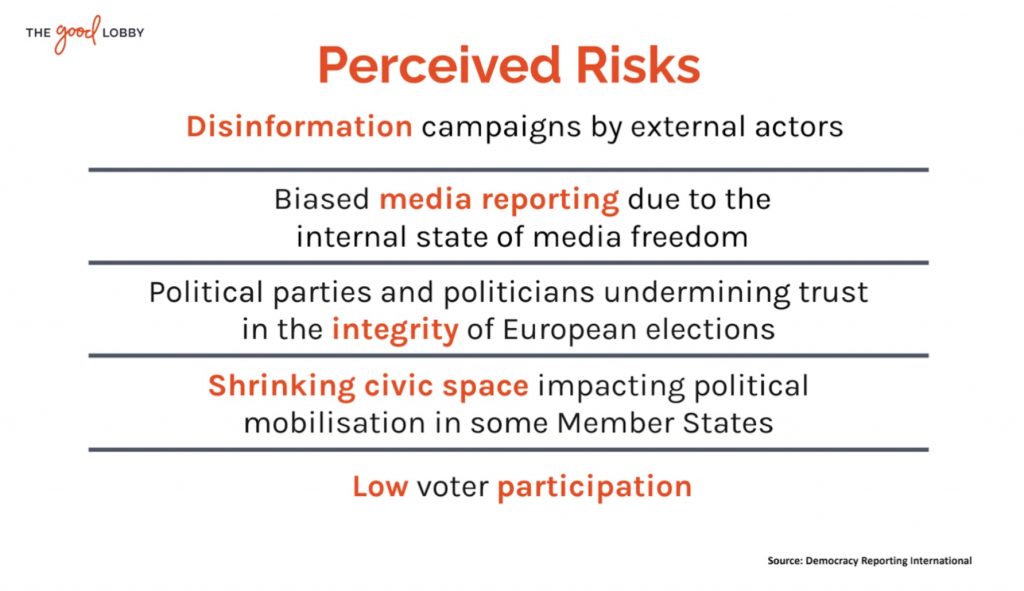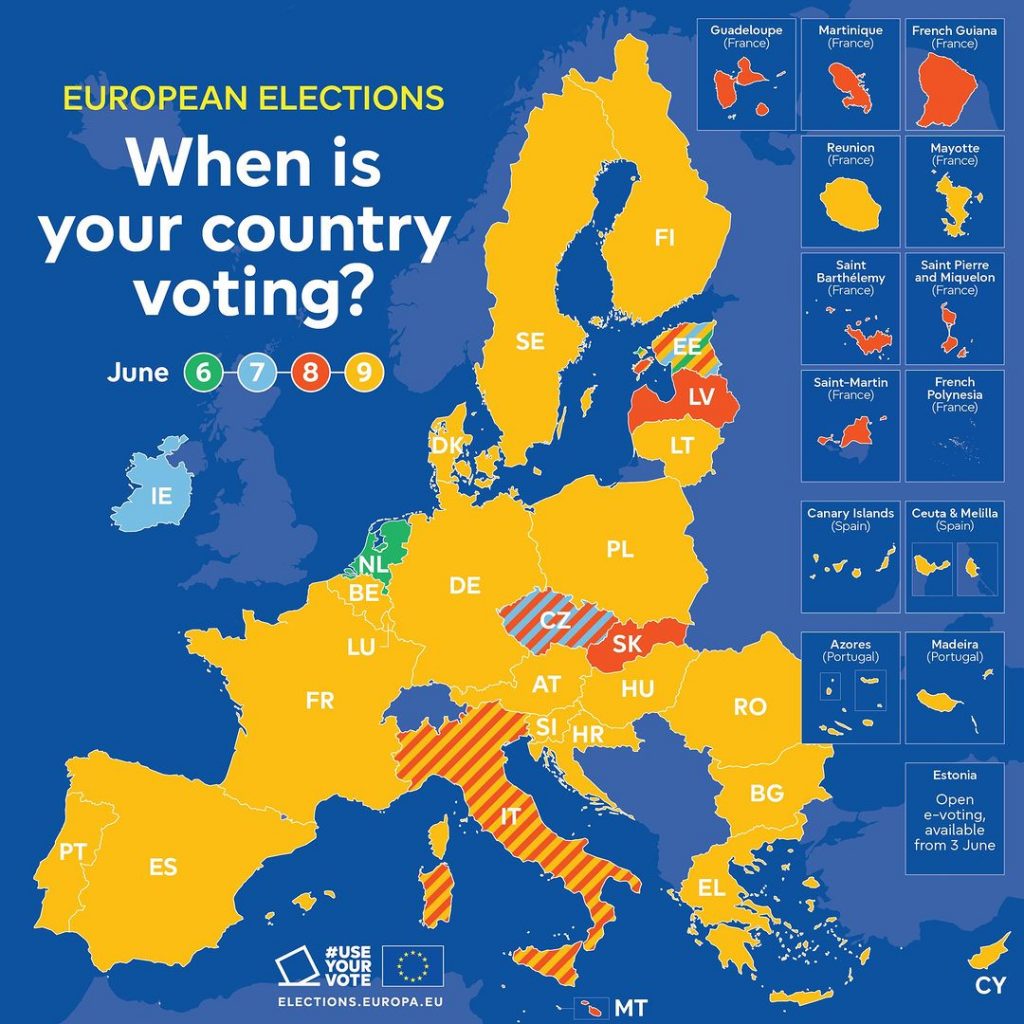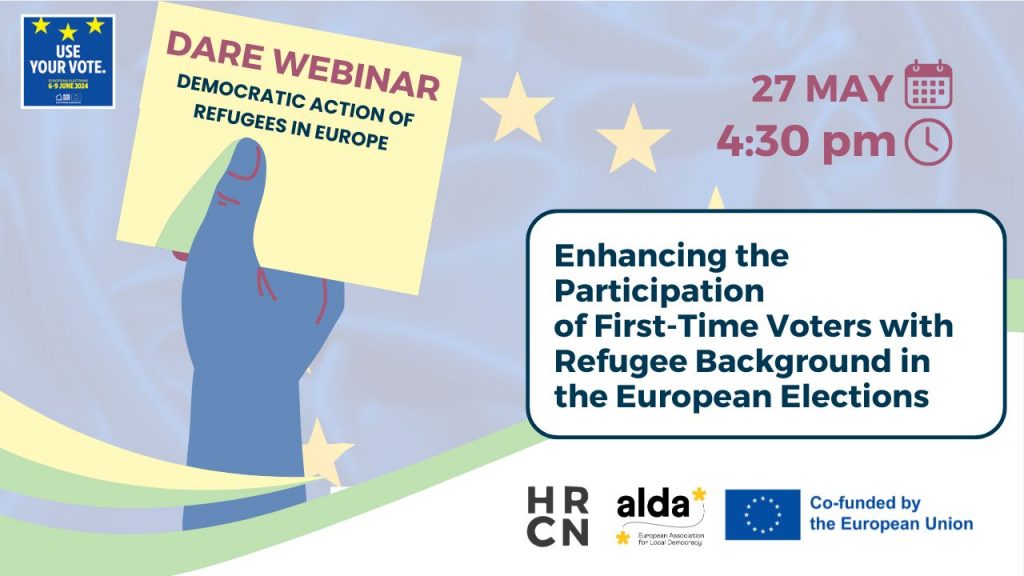Versione italiana
Version Française
On 27 May 2024, Human Rights Cities Network (HRCN) hosted a webinar to raise awareness amongst first time voters with refugee backgrounds about the European Parliament elections, why they should vote, and how they can do it. The aim is to ensure that the voices of first-time voters with refugee backgrounds are heard in the upcoming European Elections and beyond.
The moderator Margarita Spasova, Acting Director of the HRCN, was joined by the distinguished panelists Kelsey Beltz, Head of Good Partnerships at The Good Lobby, Dr. Martina Barker-Ciganikova, Election Adviser at OSCE Office for Democratic Institutions and Human Rights ODIHR, and Lefteris Papagiannakis, Director of the Greek Council of Refugees.
What are the European elections about?
For the European elections, which occur every 5 years, EU citizens elect their representatives as Members of the European Parliament (MEPs). As explained by Kelsey Beltz, the European Parliament is the only directly elected body of the European Union. Its role is to approve the budget and international treaties, as well as co-adopting or rejecting legislations, together with the Council of the European Union. Below you can see how the EU institutions interact:

Given the Parliament’s key legislative role in the EU, it has a great influence on our daily lives as EU citizens. This may range from something small such as the chargers we use, to bigger issues such as refugee rights and migration policies. Therefore, voting for which MEPs are in power is extremely important.
“Just a few votes and a few MEPs could make an enormous difference (…) even a 1% difference could be the difference between something that matters to us the most.” highlighted Kelsey.
The elections are an important tool to make sure your voice is heard. Unfortunately, they do not come without issues. Most notably:
To the above risks presented by Kelsey Beltz, Dr. Marina Barker-Ciganikova added that administrative, linguistic, and awareness barriers all contribute to making the elections inaccessible, especially for new voters with refugee backgrounds. This in turn leads to low voter participation, meaning that many voices are not being heard. As a result, we want to ensure that no one’s voice is left out in the upcoming elections, especially those of first-time voters with refugee backgrounds.
So what now?
Now, you get ready to vote. The first thing to know is when to vote, and this depends on where you are voting from within the EU:

If you are an EU citizen residing in a country different from that of your citizenship, you could still vote, however, this required prior registration. Therefore, if you have not registered, unfortunately you will be unable to vote unless you travel back to your country of citizenship. It is important to note that as Dr. Martina mentioned, you can only vote once.
Although for most countries the voting age is 18, there are a few exceptions. In Belgium, Germany, Malta, Austria you can vote from the age of 16, and in Greece from the age of 17. So if you are a minor in these countries, make sure to check on the Parliament’s website for clarifications on whether you can vote.
Despite the elections being a national and European issue, cities play an important role in facilitating and supporting them. They can be especially useful for first-time voters as they can explain how to vote. Therefore, it is important to engage with local municipalities and reach out if you need more information about how to vote.
Lefteris Papagiannakis highlighted the important role cities play in ensuring citizens with refugee backgrounds feel included and that their voices matter. According to Lefteris, if the far right prevails, the possibility of people with foreign origins to vote and participate in the political life of the Union will become more and more restricted. This is one of the many reasons why voting in this upcoming election is so important.
With the elections in a few days, make sure to read up on who you can vote for and how to vote in your specific municipality.
Still confused about the elections and need more help? Go to the following links to find out more:
- How to vote: https://www.eu2024.info/ and https://elections.europa.eu/en/
- HRCN policy paper on the important role that cities play in elections: https://humanrightscities.net/wp-content/uploads/2024/05/HRCN-Policy-Paper.pdf
- The Good Lobby EU Elections Hub, including a debriefing of various manifestos: https://www.thegoodlobby.eu/2024-eu-elections/
- EU Matrix on the latest projections: https://eumatrix.eu/
- Post-EU elections: https://www.europarl.europa.eu/topics/en/article/20240524STO21648/what-happens-after-the-european-elections
Webinar replay
- Kelsey Beltz, The role of the European Parliament, Head of Good Partnerships, The Good Lobby
- Dr. Martina Barker-Ciganikova, EU elections, how to vote, where to find more information, Election Adviser, OSCE Office for Democratic Institutions and Human Rights ODIHR
- Lefteris Papagiannakis, Director of the Greek Council of Refugees
*The DARE project is implemented by Human Rights Cities Network (HRCN), supported by alda* – European Association for Local Democracy and co-funded by the European Union.



